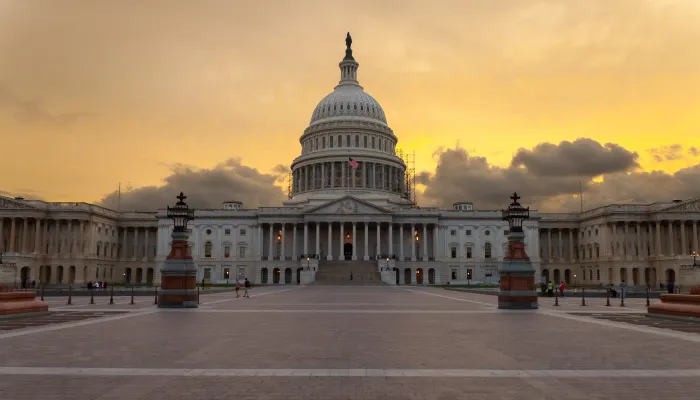Kent Conrad and Judd Gregg: The Two Budgeteers: All for One in Effort to Update Budget Act
Kent Conrad, a former Democratic senator from North Dakota, and Judd Gregg, a former Republican senator from New Hampshire, are both former chairmen of the Senate Budget Committee. They recently co-wrote an op-ed featured in Roll Call. It is reposted here.
Since ratification of the constitutional authority given to Congress to tax and spend in 1788, our government has struggled to manage the federal budget. After numerous failed budget concepts and commissions, the Budget Act was finally enacted in 1974 to establish the modern-day budget process. Almost exactly 40 years since the Budget Act was signed into law, there is growing consensus among policymakers and budget observers that the system no longer functions as intended.
As former chairmen of the Senate Budget Committee, we have personally witnessed the transformation away from a functioning regular order and toward an ad hoc approach to fiscal policy. Congress adopted an annual budget resolution, approved by both chambers, each fiscal year from 1976 through 1998. Since then, however, there have been eight fiscal years in which Congress has not approved a budget resolution. Government shutdowns, fiscal cliffs, temporary fixes and retroactive policy changes — all without serious consideration of our nation’s fiscal health — have become the new budgetary world order. Even when budget rules are in place, lawmakers evade them with gimmicks, emergency designations and waivers that result in the costs being added to our debt.
One of the core functions of Congress is to review and allocate discretionary spending each year through 12 appropriations bills. If not done by the beginning of the fiscal year on Oct. 1, then either the government shuts down or operates on a continuing resolution. As the Committee for a Responsible Federal Budget points out in a new paper detailing the problems with the current process, the average length and breadth of continuing resolutions has increased in recent years. These temporary funding extensions, along with shut downs, postpone important funding decisions and hamper the efficiency across the federal government.
We also know too well that even when budgets are produced on time, they are often political documents that lawmakers never expect to implement or enforce. Consideration of budget resolutions on the floor of the United States Senate in particular often devolves into late-night “vote-o-rama” sessions where hundreds of political messaging amendments geared to inspire campaign commercials are filed, while there is little debate on the ways to address the long-term drivers of our debt such as the need for tax reform and entitlement reform. In fact, we found the constraints of the budget process and the lack of political will to address the debt so stifling that we worked together to author legislation to create a special commission, later known as the Fiscal Commission or Simpson-Bowles, to bypass some of these process challenges.
While Congress has not complied with the Budget Act, the Budget Act has also not kept up with Congress and the changing nature of spending programs and the tax code. Items such as emergency spending, government-sponsored enterprises, credit programs, tax expenditures, budget baselines and temporary provisions all impose challenges to sound budgeting under our current practices.
The current process produces a lack of transparency, accountability and focus on the long term. Ideally, budgets should be understandable to the public and budget deliberations should reflect a discussion of Americans’ priorities for government. But our current budget process is a complex maze of multiple budget presentations including on- and off-budget spending, trust funds, current law compared to current policy baselines, and conflicting budget classifications which make it difficult to determine, much less agree, on the true budget outlook or the amount of resources should be devoted to various priorities.
The country’s substantial long-term challenges underscore the problems with the budget process, as an increasing portion of the budget is on autopilot and continues to grow at an unsustainable rate that threatens long-term fiscal sustainability. In 1973, the last full fiscal year before the Budget Act was signed, Social Security and Medicare spending was 4.2 percent of gross domestic product and tax expenditures, or spending through the tax code, were about 5 percent. In 2013 those numbers had jumped to 8.4 and 7.8 percent, respectively, each about as large as the entire discretionary budget.
To address these challenges, we need a budget process that rewards setting goals for and enforcing long-term debt stability. While budget process reform isn’t a panacea, a budget process that makes it easier for Congress to be fiscally responsible can help spur further bipartisan action on the substantive policy changes needed to fix the debt.
The right budget process would provide a structure for policymakers to confront the trade-offs in the budget and make decisions and reach consensus about priorities, useful information to policymakers about effects of legislation, transparency and accountability in budget decisions, and effective enforcement of the budget goals that are agreed to as Congress considers other legislation. Process reforms cannot substitute for the political will to make difficult decisions, but an improved framework could lead to more responsible decision making.
"My Views" are works published by members of the Committee for a Responsible Federal Budget, but they do not necessarily reflect the opinions of all members of the committee.


